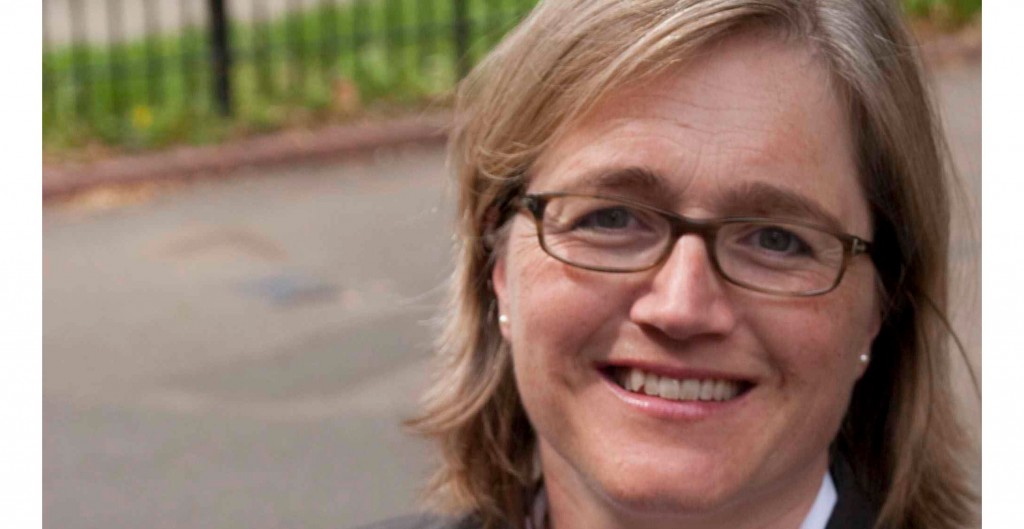Meet the opposition on Islington Council. Her name is Caroline
 Little did Caroline Russell (twitter) know when she stood for election to Islington Council earlier this year that every single seat on the council, bar hers, would be taken by Labour – leaving her the sole opposition on the council (and one of four Green councillors in London).
Little did Caroline Russell (twitter) know when she stood for election to Islington Council earlier this year that every single seat on the council, bar hers, would be taken by Labour – leaving her the sole opposition on the council (and one of four Green councillors in London).We decided to have a chat to Caroline about what that feels like, her priorities for the next four years and how on Earth she’s going to cope facing off 47 Labour councillors on her own.
Congratulations on your recent election. How does it feel to be Islington council’s lone opposition councillor?
Thanks. It’s a huge honour, a massive responsibility and an incredible opportunity both for me personally and my local party to take campaigning a step further and really be able to make a difference. I’m getting the hang of being a ward councillor but I’m still working out the sole opposition councillor role. It’s a very unusual situation to have a single opposition councillor and council systems and processes are not really set up for it. I wrote about this at more length a few days ago for politics.co.uk here.
Under First Past the Post it can be difficult for smaller parties to get elected. How did you manage it?
With quite a bit of effort on the part of an amazing team of Islington Greens and people from other local parties too. We were disappointed when we lost our seat on the council in 2010, but we decided to fight every by election hard and get better at contesting elections. We’re building an ever growing team of activists and have made steady electoral progress: we were second to Labour in every ward in Islington North in the 2012 mayoral election and came second to Labour across Islington in the locals this year.
In the end it was a very close election. We realised we needed to fight a three way contest or Labour would walk it, so we focused on the main Lib Dem target ward for a couple of years leading up to May 2014, building contacts through door knocking and regular campaigning. Of course we ran a very full on target ward campaign harnessing the efforts of Islington Greens across the borough and indeed from across London. We had also chosen a ward where I have lived since 1992 and where I have raised my kids and been an active citizen: chair of school governors, chair of Islington Living Streets, school dinners campaigner, 20 mph campaigner, citizen science air pollution coordinator, Chair of the safer neighbourhoods panel and participant in countless local stakeholder consultations. So I am known by people across the ward and I think in the end that made the difference – there were huge numbers of split votes and being known locally is what may have got me over the line and elected (by just 8 votes).
Labour had 67 activists knocking up on election day in Highbury East, but we had prepared our ground well and had a very organised team door-knocking all day. Since we won the seat by just eight votes everyone involved has an example of someone they persuaded to go out and vote who may have made the final difference.
What are your priorities for the next four years as a Green councillor?
My main priority is to be a decent ward councillor and represent residents in my ward effectively. The impact of the government austerity agenda can be seen on a daily basis and I will do whatever I can to help people through. I would also like to see some strategic decisions made about investment in the ward using the Section 106 money available to us. The biggest open space in Islington is in Highbury East and desperately needs some investment.
I also want to build on Green Councillor Katie Dawson’s legacy, which includes multiple creative green measures such as a policy for no net loss of permeable land to minimise the risk of flash flooding from extreme weather events and the wonderful Bright Sparks project that offers training and skills to young people while mending small electrical items that might otherwise end up in landfill. She also proposed the motion that saw Islington become the first borough to address health inequality by implementing a borough wide 20 mph limit.
On a personal level I am a campaigner for a more liveable city with streets designed for the safe and convenient movement of people (on bikes, on foot and by public transport). Making more people-friendly streets would reduce road danger, clean up our air and encourage active travel (walking and cycling) which help to address significant public health issues facing Islington: rising health inequality, rising obesity, diabetes and lung and heart health problems. If I can build on Katie Dawson’s 20 mph limit and influence the council to start tackling health inequality by thinking about how transport decisions can affect public health, then I will feel I have made a positive contribution. The Labour council’s recent decision to increase parking capacity by 844 spaces flies in the face of any public health and fairness agenda.
Islington council has a reputation for leaning further left than many other Labour councils. Do you think that reputation is well deserved?
Apart from their blind spot about transport, I think Islington Labour have done well in facing off the Coalition Government’s austerity agenda. For example, they are one of the few councils who have managed to retain adult social care for those with moderate needs which helps keep families from reaching crisis point when more expensive interventions become necessary. The Fairness Commission was ground breaking and has clearly shaped the work of the council effectively. So yes, they do deserve a reputation for being left-leaning.
However there are areas where Islington Labour need to be kept on their toes: they have an extraordinary enthusiasm for CCTV and private policing of streets at night. The latest round of cuts will inevitably see hard decisions. The local paper splashed recently with a leaked paper running through some hideous worst case scenarios which involved shutting multiple libraries, Cally pool and more. I will be doing all I can to ensure that Labour are not blind to the long term costs of decisions made to create a short term revenue gain. For instance, I suspect that I will have to push hard to prevent further increases in parking capacity. By all means charge more for existing parking but encouraging more cars into Islington by creating more parking spaces is not the right solution to revenue raising as it ignores the public health costs due to physical inactivity and air pollution.
In an age of nationally directed austerity how much scope do councils have to protect services from cuts, let alone build new council houses or pour new funding into much needed projects?
This is really hard and requires creative thinking. In order to achieve some social housing (obviously a good thing) Labour have landed us with a lot of affordable housing at 80% of market rents – this is unaffordable to anyone on an ordinary salary. We also have rather a lot of designer flats created for the investment market rather than as homes for local people. We need to be finding ways to build more social housing, investigating community land trusts and also specifically addressing the precarious housing situation that many older women find themselves in as private rents soar.
In the end, cutting frontline services costs more. The austerity agenda is economically illiterate. However I do not have a magic wand or any easy answers. We are all in a really tough situation and I fear that while some creative thinking may make some difference at the margins, it will be very tough until there is a change in government direction.
And finally… you have a formidable reputation as a local campaigner. Particularly on environmental issues you’ve made your mark on council policy long before you were elected this May. What’s your top advice to community campaigners trying to be more effective?
Focus on things that will have an effect on people’s lives locally. The big picture stuff is really important and people care about it, but when it comes to local elections it’s about things like housing and streets and public health: things the local council can make a difference on.
You also need to understand how the local council works: basic things – lots of people don’t know the difference between a council officer and an elected councillor. It also helps to understand the scrutiny process and how policy can be influenced. Sitting in on council meetings can seem like dry stuff but you can contribute as a resident or campaigner and really make a difference. There are just 48 councillors covering Islington, I think its really important that councillors work with residents – we need residents and campaigners at meetings in the Town Hall pushing us to do better.


August 18, 2014 - 9:56 am
“We also have rather a lot of designer flats created for the investment market rather than as homes for local people. We need to be finding ways to build more social housing, investigating community land trusts and also specifically addressing the precarious housing situation that many older women find themselves in as private rents soar.”
A really interesting chat, thank you :)concerning the above quote I couldn’t agree more. I did wonder what was meant by “investigating community land trusts”? And what one would hope to find, if and when, an investigation began?